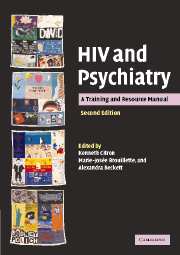Book contents
- Frontmatter
- Contents
- List of contributors
- Preface
- 1 Medical overview
- 2 Cognitive disorders in people living with HIV disease
- 3 General principles of pharmacotherapy for the patient with HIV infection
- 4 Mood disorders and psychosis in HIV
- 5 Suicidal behavior and HIV infection
- 6 Anxiety disorders and HIV disease
- 7 General issues in hospital HIV psychiatry
- 8 HIV and people with serious and persistent mental illness
- 9 Psychotherapy
- 10 HIV and substance use disorders
- 11 Psychiatric issues in pediatric HIV/AIDS
- 12 Uninfected children of parents with HIV
- 13 Psychological issues faced by gay men
- 14 Women and HIV
- 15 Couples
- 16A HIV and cultural diversity
- 16B African Americans
- 16C Latinos and HIV disease
- 16D One heart, two spirit, and beyond: HIV and the people of the First Nations
- 17 HIV in prison populations
- 18 Legal and ethical issues
- 19 Psychiatrist as caregiver
- Appendix I HIV Counselling checklist for physicians
- Index
- References
6 - Anxiety disorders and HIV disease
Published online by Cambridge University Press: 06 August 2009
- Frontmatter
- Contents
- List of contributors
- Preface
- 1 Medical overview
- 2 Cognitive disorders in people living with HIV disease
- 3 General principles of pharmacotherapy for the patient with HIV infection
- 4 Mood disorders and psychosis in HIV
- 5 Suicidal behavior and HIV infection
- 6 Anxiety disorders and HIV disease
- 7 General issues in hospital HIV psychiatry
- 8 HIV and people with serious and persistent mental illness
- 9 Psychotherapy
- 10 HIV and substance use disorders
- 11 Psychiatric issues in pediatric HIV/AIDS
- 12 Uninfected children of parents with HIV
- 13 Psychological issues faced by gay men
- 14 Women and HIV
- 15 Couples
- 16A HIV and cultural diversity
- 16B African Americans
- 16C Latinos and HIV disease
- 16D One heart, two spirit, and beyond: HIV and the people of the First Nations
- 17 HIV in prison populations
- 18 Legal and ethical issues
- 19 Psychiatrist as caregiver
- Appendix I HIV Counselling checklist for physicians
- Index
- References
Summary
Introduction
Anxiety disorders may occur any time in the course of HIV disease and are most likely to become manifest at pivotal points in disease progression (Elliott, 1998). Most people with HIV respond adequately to the stress of living with the disease and are able to limit the impact of disease-related anxiety on their daily functioning and quality of life. They cope with medical problems, employment changes, family struggles, relationship difficulties, financial hardship, and the uncertainty of the disease process itself. In these circumstances, anxiety is often considered a normal psychological response to stress (American Psychological Association, 1999).
For some patients, however, the anxiety is so severe and persistent that it can significantly impair their ability to function and would be diagnosed as a disorder. In the USA, prevalence rates for anxiety disorders among patients with HIV disease range from 5–40% (McDaniel and Blalock, 2000). The estimates vary widely for two reasons:
anxiety is often part of a complex symptom picture that frequently includes concurrent mood disorders and psychoactive substance use disorders
prevalence data often come from retrospective, cross-sectional studies that do not address whether anxiety preceded or followed HIV infection.
Despite this wide range in prevalence estimates, a pattern has emerged over the last 5 years. According to several recent studies, the point prevalence of anxiety disorders in HIV-seropositive patients is not significantly different from that of HIV-seronegative clinical comparison groups.
- Type
- Chapter
- Information
- HIV and PsychiatryTraining and Resource Manual, pp. 120 - 127Publisher: Cambridge University PressPrint publication year: 2005
References
- 1
- Cited by



